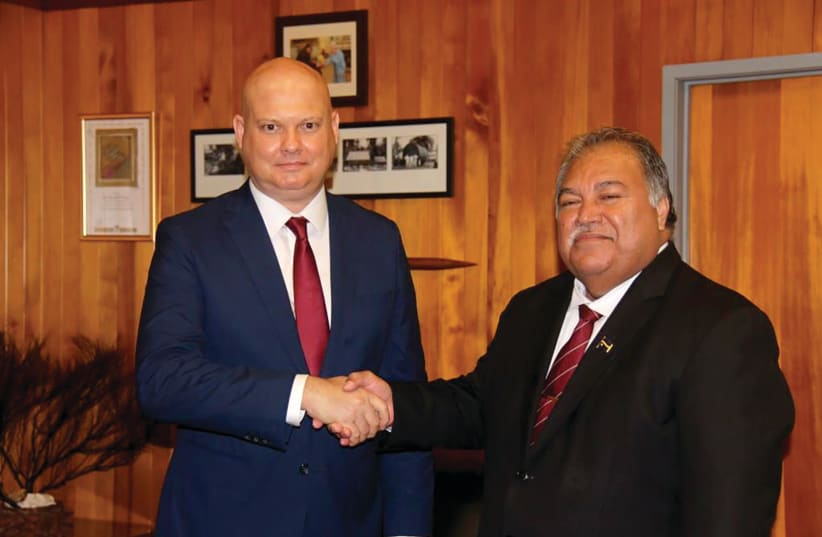The Sovereign Military Hospitaller Order of St. John of Jerusalem, Rhodes and Malta is a unique entity that has its roots spread all the way back to the Knights Hospitaller chivalry order, established in Jerusalem a millennium ago. The Order is the only sovereignty in the world that possesses no land, one of three to have a permanent observer status to the United Nations General Assembly and the only one whose existence is focused solely on humanitarian activity.
From the interview I had with the order’s ambassador to the Republic of Nauru, Dr. Fabrizio Bozzato, in coordination with the Order’s Grand Magistry (its government), a window to dialogue and cooperation with Israel is clearly open. Bozzato is just as unique as the entity he represents. He is an Italian diplomat and scholar who has been living on three continents for the last five years. He was appointed as the Order’s ambassador to Republic of Nauru a year ago, just a few months before he was awarded Knighthood of the Order of the Star of Italy by the Italian president.
When asked about the Order’s purpose, Bozzato smiles and calmly responds, “Our diplomatic service exists to facilitate humanitarian activity. Our mission is to promote peace, human rights and stand with the forgotten people in the world.”
Indeed, the Order, which once held the task of healing and defending Christian pilgrims while possessing one of the most powerful fleets in the Mediterranean Sea, no longer operates an active military and focuses solely on humanitarian activity.
“The Order had its start with the establishment of a hospital in Jerusalem in 1099, and even before that it was a fraternity to the pilgrims, but also to the people of Jerusalem, without any distinction of fate,” says Bozzato. “For instance, in the order’s first hospital, Jewish people were given kosher food.”
The diplomatic activity of the Order is indeed very apparent, having diplomatic relations with 110 countries, and an annual budget of 1.5 billion Euros. The money is used for operational projects that include natural disaster aid in Indonesia, Nepal, Philippines and Haiti, disabled camp in Lebanon, and The Holy Family Hospital in Bethlehem – which is considered one of the best-equipped hospitals in the region, and has just recently received its own oxygen center, which allows it to help those affected by the coronavirus.
When asked about Israel, Bozzato says, “The Order is not a newcomer to this part of the world and has been there since the 10th century, settling under the Caliphate, even before the Crusades, and staying even after Saladin conquered Jerusalem. The Order’s operational procedure is diplomatic. This is because we don’t get involved in local politics and don’t seek any disagreement and conflict with the government of the country or territory where we are active.”
Bozzato continues, “Projects must be agreed with the government of Israel. In my personal opinion, it would be good that a diplomatic dialogue starts as well. Ideally, this would be conducive to the establishment of diplomatic relations.”
With that in mind, it is worth mentioning that Bozzato is the first ambassador of the Order who has engaged in a joint academic activity with Israel. He co-chaired the Humanitarian Diplomacy and Jewish Studies workshop in Taiwan in 2019, together with Prof. Dov Ber Kotlerman of Bar-Ilan University, dedicated to the Asian Righteous Among Nations – Chiune Sugihara of Japan and Ho Feng Shan of China. “I think that the highest form of diplomacy is humanitarian diplomacy,” he says.
Bozzato asks to end our conversation on a practical note. “Israel is an agronomy and land science powerhouse. The Order has several agricultural missions all over the world because we believe it is not productive to heal people if they have no sustenance and eventually fall ill again. Therefore, partnership in those agricultural initiatives is a way that the Order and Israel could collaborate.”
The writer is a lawyer who serves as a board member at Nister International Relations think tank
